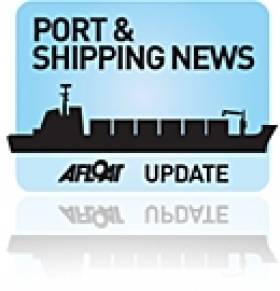Displaying items by tag: Atlantic Companion
#ShipRepairs – Atlantic Companion, the massive containership that was in Irish waters bound for Canada, having undergone repairs in Bantry Bay last week, is instead returning today to Liverpool, her last port of call, writes Jehan Ashmore.
As previously reported on Afloat.ie, the 57,000 tonnes vessel this day last week, had lost engine power and drifted for almost 12 hours off the Cork coast.
Altantic Companion, a G3 generation class 'con-ro' vessel which can carry containers and vehicles, was en-route from Liverpool to Halifax, however, she developed problems with one of the six cylinders on its main engine, but was able to reach the shelter of Bantry Bay.
Following repair work, it was then expected according to the ships owners, Atlantic Container Line (ACL) that the 1984 built Swedish-flagged containership would last Thursday, resume its trans-Atlantic voyage to Halifax.
Afloat.ie adds that Atlantic Companion had actually departed Bantry Bay the following Sunday but it transpired she set a different course not to Canada but a reverse passage bound for Liverpool. This involved a routine transit by the ACL ship through the Vessel Traffic Separation Scheme (VTSS) of Wexford's south-east coast until she arrived off Anglesey last night and from where she anchored.
Also last night along this same stretch of the north-west Welsh coast, sisters, Atlantic Concert was heading for Liverpool while Atlantic Cartier was in the reverse direction bound for Halifax, Canada.
For more than 40 years, ACL has been a pioneering force and leader in the North Atlantic Trade operating liner services between European ports and the US East coast.
The 2,160 TEU containership, Atlantic Companion and her sisters, may 'not be seen nor heard' off the Irish coast, however, ACL have gained a respected name in ocean transport having started off in the mid-60's with the inaugural G1 vessels then only capable of transporting 700 containers.
Afloat.ie will have more to report and that of ACL's new tonnage replacement programme, in which the first of the next G4 class newbuilds is expected for delivery by the middle of this year.
























































